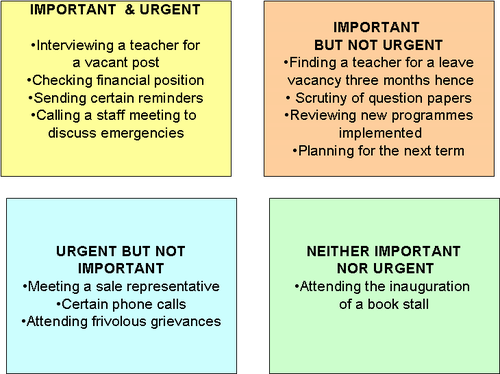Time Mangement
Contents
Time Management
Good time management puts one in control of his life. It reduces stress and enables progress. Some ideas to enable you manage time wisely are explained below.
Prioritizing
Prioritizing is about making choices of what to do and what not to do. To prioritize effectively you need to be able to recognize what is important, as well as to see the difference between urgent and important.Look at the diagram below to see how Mrs. Pereira, a High School Principal, has prioritized tasks for the week.
Mrs. Pereira takes up important and urgent jobs on a priority basis. She totally ignores those that are not important and not urgent. Urgent but not important tasks stand knocking at your door. They have to be dealt with and hence cannot be totally ignored.Mrs. Pereira directs them to the right department. By delegating some of these tasks, she can deal with them and at the same time not waste time. Tasks that are important but not urgent should not be kept until the last, then they become urgent and important. It is wise to consider some of these jobs as and when time is available.
With good prioritizing skills, complete all the important urgent tasks, the ones that would get you into a crisis if not done. Then, you focus your attention on those most important, but not urgent tasks, the ones that are most rewarding in the long run. When you set priorities in to do lists, also keep asking yourself if any of your tasks can be eliminated or delegated.
Effective Scheduling
For scheduling, be sure of what time you set aside for your work.Make time available for absolutely necessary actions. Review your list of things to be done and check if anything there can be delegated.Set aside some contingency time for interruptions. The rest of the time available with you is time available to deliver your priorities and achieve your goals.This is the time you actually get to work. Many managers complain there is no time left at all.Then you need to reconsider the previous steps... are you delegating enough? Could some of the interruptions be eliminated? Read the following Case study and identify strategies used by Mrs.Jones for effective scheduling.
| Mrs. Jones manages a school that has about 500 students.She is in school from 9 am to 3 pm. Every night, she makes a list of tasks to be done. Here is her list for a particular day: 1. Meeting the Educational Authorities. |
What special features did you notice about Mrs. Jones' Time Mangement Skills?
Golden Rules to Manage Time Wisely
1. Avoid procrastination
2. Get organized. De clutter your workspace, your computers and your mind. Arrange necessary files together. Practice good filing patterns.More often than not precious time is spent searching for material that is misplaced.
3. Have a to-do list. Mobiles, notepads, computers ---all can be put to good use for making to-do lists. Strike out each task as it gets done.
4. Use techniques as prioritization and delegation.
5. Never keep tasks until the last minute. Try to complete it as soon as you can.
6. The first time you do something do it well. Revision and reconstruction can be done. But a well done task saves time later.
7. When you expect tasks done by others, spell out clearly what is expected. It saves the time of others and your own.
8. Avoid time wasters as gossiping.
9.Certain tasks can be done collectively. Example: You want a few print outs,get them at a stretch rather than going to the printer several times.
